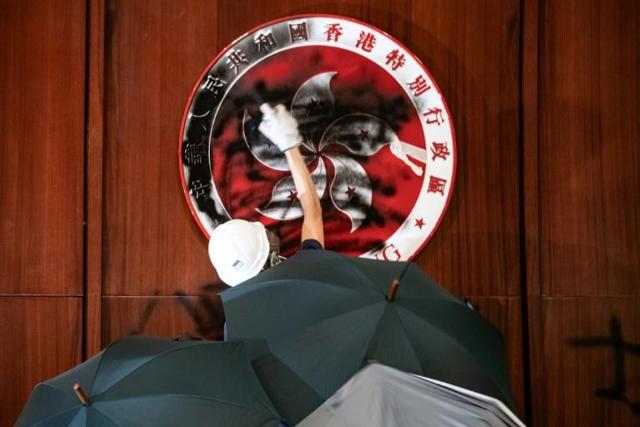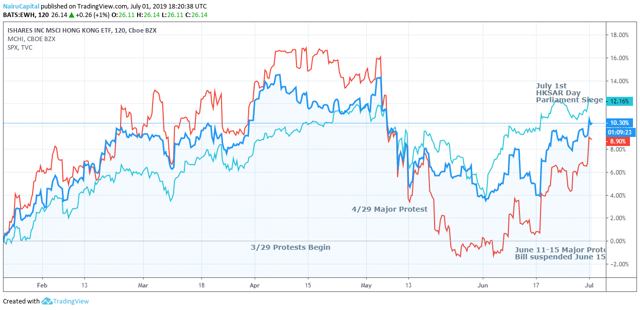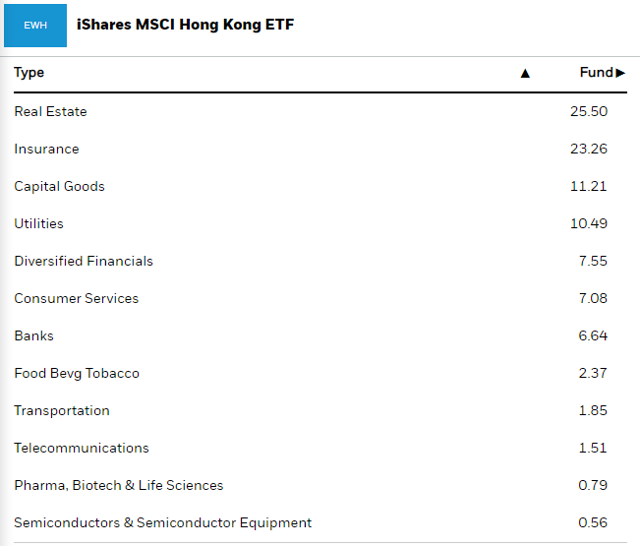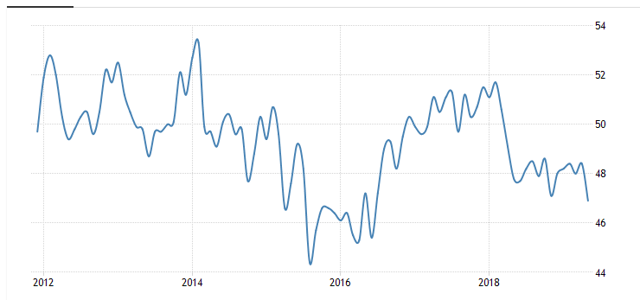[ad_1]

(Source: AFP)
On July 1, hundreds of protesters wearing yellow hard hats stormed the Hong Kong parliament building and defaced the post-1997 emblem. Many were seen raising the British colonial flag and pleaded to G-20 leaders, including Trump, to assist in their cause. The primary concern of protesters is a bill from the Hong Kong government that would allow the Chinese government easy extradition. However, for many Hongkongers, it is about much more – fear that the “One country, two systems” pledge will devolve into a single system with less economic and personal freedoms than currently.
While the validity of their fears is outside of our scope for market research, it seems certain that the escalating tension will have a negative impact on the Hong Kong economy and its stock market.
The protests began on March 31st and have had estimated fluctuating counts of between 100,000 to (possibly) 2 million people. They have become increasingly aggressive on both sides, as the police recently resorted to rubber bullets and tear gas toward peaceful unarmed protesters. On the other hand, demonstrators have increasingly adopted more aggressive tactics over the past month, such as the large-scale vandalization of government property as seen on Monday. This came after the extradition bill was indefinitely postponed.
To us it seems this wave of mainland-Hong Kong clashing is unlikely to end quietly as in the 2014 Umbrella Movement. Investors with allocations in Hong Kong or anywhere in Eastern Asia should keep a close eye on these events and may want to position themselves away from the region. The protests have yet to considerably affect markets, but as tensions continue to climb with no appearance of ending, they likely will result in a negative economic shock.
Technical Protest Sensitivity
The iShares MSCI Hong Kong ETF (EWH) represents a basket of the largest publicly traded companies based in Hong Kong. It is important to note than most of these corporations do the majority of their business abroad, so their bottom line is tied largely to the economy across Asia. Even still, we can see below that stock prices appear to have been slightly harmed by the protests.
Here is an annotated chart since the beginning of the protests. Hong Kong (EWH) is in blue, while the mainland (MCHI) is in red. S&P 500 was also added in turquoise to help differentiate trade war and protest news:

(Source: TradingView)
It is slightly difficult to surmise performance shocks, because both trade war news and protest news have been affecting the markets concurrently. This was seen on Monday (July 1), as large protests occurred along with positive trade news, resulting in a gain for both countries despite the parliament building raid.
Protests have typically resulted in small gaps lower, with EWH being affected more than MCHI. Further, in times of growing uncertainty, such as in April and June 11-16, both Asian regions saw stagnation, while the United States kept climbing. This is a signal that the demonstrations have had at least a slight impact on markets.
Though it is difficult to tell, it seems to us that Hong Kong stocks are becoming increasingly sensitive to demonstration-related news. The protests in April and May did not affect the market nearly as much as the larger ones of June 11-15. It will be more clear retrospectively, but that also seems true today, as Hong Kong stocks have been falling more from their open price than other trade sensitive countries.
Now that the extradition bill has been suspended (though likely to reemerge), demonstrators have shifted their focus toward causing their Chief Executive Carrie Lam to step down. If this occurs, it will almost certainly negatively impact the markets, as investors tend to allocate away from areas with that level of political turmoil. Though she offered an apology for the social upheaval, her approval rating fell at a staggering rate, from 33% in early June to 23% on June 23. Indeed, this black swan-type risk is moving into reality.
A Quick Note On Fundamentals
Though this article is about the growing political risk for investors, it is important for us to look at the fundamentals of the economy to see how truly sensitive it is to Chinese tensions. Obviously, if clashing escalates and China becomes more involved either economically or physically, it is safe to assume their stock market will be harmed considerably. Even if the situation continues and there is no great increase in uncertainty, the Hong Kong economy still does not appear to be stable.
According to iShares, the ETF is not very highly valued, with an average P/E ratio of just under 14 and an average P/B ratio of 1.37. It also has a dividend of about 2.3%. While these may seem low, it is key to note the Hong Kong economy is largely made up of its finance and finance-related sectors that typically have P/E ratios at or below this level.
Here is the sector breakdown:

(Source: iShares)
Real Estate is the largest sector that the ETF has exposure to, which is a major risk for investors. Obviously, mass demonstrations do not encourage people to buy property, but even without that factor, Hong Kong is the world’s most expensive city with an average home price of US$1.2 million. This gives the small country a staggering median home price-to-income ratio of 18. At the peak of the housing bubble in 2006, that figure was only roughly 7 in New York City (the most comparable to Hong Kong).
On top of that, Hong Kong’s private sector PMI has recently crossed below 50 and looks as if it may continue lower. Here is a chart of the country’s private sector PMI:

(Source: Trading Economics)
PMI is an aggregated measure of leading economic indicators and has been shown to lead GDP growth. This is a signal that GDP growth in the area is more likely to be negative in quarters to come Further, if the GDP does fall more than it already has, home prices are likely to fall with it. Indeed, the housing bubble in China and its neighbors has a very long way to fall once this occurs.
Hong Kong Best to Be Avoided
Today, it is unclear and honestly impossible to tell if the protests will result in a severe economic shock. Though, because demonstrations have yet to significantly negatively impact the country’s stock market, an end to protests is unlikely to cause any gains for Hong Kong stocks. Currently, the protests only represent downside risk.
If Carrie Lam is ousted, or if China puts more pressure on Hong Kong, it is likely many equity, debt, and real estate investors will require a risk premium on their investment that does not currently exist. If you are long, it seems best to be ahead of such investors and allocate toward safer areas of the globe with more upside potential.
On top of this growing risk factor, the Hong Kong economy is not in a safe spot. Home prices are unlikely to continue to rise, as households already have a debt-to-GDP of over 70%, and incomes already struggle to make mortgage payments, with 70% of a monthly paycheck going toward that. Indeed, the fate of an economy built on its finance sector is ultimately wedded to real estate prices and the perception of economic and political instability.
Today, we placed a short position on the ETF via a small put option. This obviously has major risks, such as a Chinese trade deal (which, for reasons beyond our current scope, we see as unlikely) or factors related to the U.S dollar, as the Hong Kong dollar is pegged to it.
Even still, over the next few months, we see much more downside risk than upside opportunity for Hong Kong’s stock market. The worst-case scenario is a large recession in Asia or globally, which may result in 30%+ downside for the ETF or a continued increase in mainland-related tensions which is not calculable but could potentially be much worse than a recession.
That said, over the long run (5 years-plus), we see Hong Kong as a positive investment given it is still a free and capitalist society. After the Real Estate bubble is corrected and political risks fall, we do expect the economy to perform well. It has a hardworking and increasingly innovative population that is not encumbered by high government debt and worrisome deficits as in the U.S and Europe.
Want to Keep Following Events in Hong Kong?
We are proud to announce that next week we will be launching our first marketplace service! The “Country Club” will be a dedicated service that focuses on single-country and regional ETFs with the goal of helping our subscribers diversify globally and better grasp on how world events will affect their portfolio. We will certainly have a lot more news surrounding events in Asia and Hong Kong. Please give us a “Follow” if you would like to be notified upon our launch!
Disclosure: I am/we are short EWH. I wrote this article myself, and it expresses my own opinions. I am not receiving compensation for it (other than from Seeking Alpha). I have no business relationship with any company whose stock is mentioned in this article.
[ad_2]
Source link Google News
